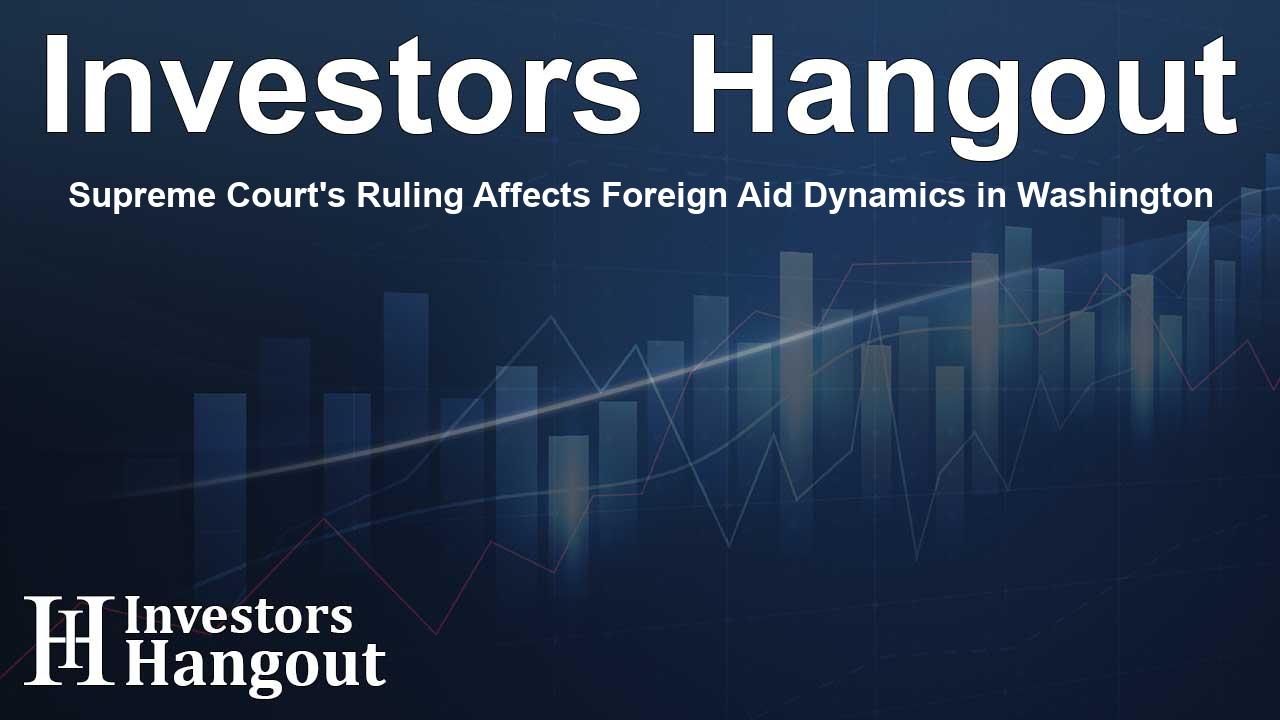Supreme Court's Ruling Affects Foreign Aid Dynamics in Washington

Supreme Court Rules on Foreign Aid Funding
The recent ruling from the Supreme Court allows the current administration to maintain a freeze on $4 billion in foreign aid, a decision that has significant implications for budget management as the deadline approaches.
Court Supports Executive Authority in Fund Dispute
The court's decision comes as a reversal of a previous order given by a U.S. District Judge, which had mandated the immediate release of funds approved by Congress. The Supreme Court indicated that at this stage, the executive branch presented adequate justification for the freeze, arguing that the lawsuit should not proceed under the Impoundment Control Act.
Concerns Over Foreign Policy
The justices highlighted that any potential interference in the administration's foreign policy efforts could have more extensive repercussions than the harm posed to individual parties involved in the lawsuit.
Unique Budgetary Strategy Employed by Administration
This freeze follows a controversial maneuver dubbed “pocket rescission,” which Trump introduced earlier. By proposing this method, the administration seeks to cancel allocated funds as the fiscal year comes to a close. There is a need for legislative action, or the funds may become obsolete as the review period concludes.
Legal Arguments Raised
The Solicitor General argued that maintaining the judge's order could lead to a rapid expenditure of funds, which would complicate Congress's review of the administration's proposal. This situation underscores the challenges of managing appropriated funds during budgetary negotiations.
Dissents from the Liberal Justices
In a dissenting opinion, Justice Elena Kagan, joined by Justices Sonia Sotomayor and Ketanji Brown Jackson, emphasized that this case presents unprecedented issues that directly relate to the balance of power between the executive and legislative branches. Kagan expressed concern that the executive's claims of legislative conflict merely reflect standard frustrations that any president must face.
Ongoing Challenges in Funding Disputes
This legal battle is part of a broader contest surrounding approximately $30 billion in foreign aid, which Trump initially put on hold during his tenure. As the budget deadline nears, discussions about the remaining approximately $10.5 billion in funding take center stage, of which $4 billion remains under contention following the administration's targeted allocation efforts.
Legal Journey to the Supreme Court
The ongoing saga began when various global health and aid organizations filed lawsuits in response to the funding freeze, culminating in the Supreme Court hearing these cases. In earlier verdicts, the justices narrowly ruled against blocking substantial aid payments, further illustrating the contentious landscape of foreign aid and policy enforcement.
Conclusion
The Supreme Court's decision not only affects the immediate situation concerning foreign aid but also reflects larger themes of executive power, legislative authority, and the intricate balance of governance in the United States. As these issues evolve, the results from this ruling may set precedents affecting future interactions between the branches of government.
Frequently Asked Questions
What was the Supreme Court's ruling about?
The Supreme Court ruled to uphold the freeze on $4 billion in foreign aid, allowing the administration to maintain control over these funds for now.
What are the implications of the court's decision?
The ruling may affect the relationship between the administration and Congress, especially regarding budget decisions and foreign aid management.
What is a “pocket rescission”?
A pocket rescission is a strategy used to cancel appropriated funds late in a fiscal year, raising legal and procedural questions about legislative control over funding.
Which justices dissented in this ruling?
Justices Elena Kagan, Sonia Sotomayor, and Ketanji Brown Jackson dissented, arguing that the case presents significant constitutional questions.
How does this ruling fit into the broader context of government funding?
This ruling is part of an ongoing struggle over approximately $30 billion in foreign aid that Trump had initially placed on hold, reflecting the complexities of budget management in government.
About The Author
Contact Ryan Hughes privately here. Or send an email with ATTN: Ryan Hughes as the subject to contact@investorshangout.com.
About Investors Hangout
Investors Hangout is a leading online stock forum for financial discussion and learning, offering a wide range of free tools and resources. It draws in traders of all levels, who exchange market knowledge, investigate trading tactics, and keep an eye on industry developments in real time. Featuring financial articles, stock message boards, quotes, charts, company profiles, and live news updates. Through cooperative learning and a wealth of informational resources, it helps users from novices creating their first portfolios to experts honing their techniques. Join Investors Hangout today: https://investorshangout.com/
The content of this article is based on factual, publicly available information and does not represent legal, financial, or investment advice. Investors Hangout does not offer financial advice, and the author is not a licensed financial advisor. Consult a qualified advisor before making any financial or investment decisions based on this article. This article should not be considered advice to purchase, sell, or hold any securities or other investments. If any of the material provided here is inaccurate, please contact us for corrections.
